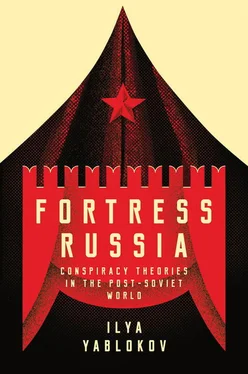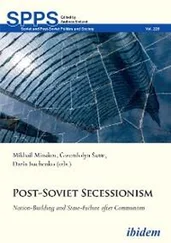One of the speakers in the documentary, a Lithuanian journalist, admitted that a high-ranking US spy, who was stationed in Vilnius before the 1991 events, acknowledged that US troops were already in the country by the end of perestroika , and were involved in preparing the riot and promoting the independence of Lithuania. The inclusion of Vilnius in the documentary is crucial for understanding how the conspiratorial discourse spread during the post-Soviet period, and how its main tenets made it so convincing. As discussed in previous chapters, the notion that the independence movements in the Baltic states were encouraged by US espionage networks is central to the post-Soviet anti-Western conspiratorial discourse. This plot line, which connected Vilnius, Kyiv and Skopje, suggested that the West was behind the bloodshed caused by these protests; this meant that the regime changes in those countries placed them all in the same position, as victims of the USA’s lust for power. Popular revolts against corrupt and oppressive regimes, even if they are justified, are presented as the results of brainwashing techniques on the part of ‘Western sponsors’; this justifies the removal of political opponents within those regimes. In this way, journalists have been preparing the ground for the Kremlin’s approach to future protests in Russia against government corruption, following the same violent methods that were applied during the street rallies in spring 2017 ( Kremlin.ru, 2017).
As she had done in 2012, Veronika Krasheninnikova provided an expert opinion on the nature of foreign NGO activities. All organizations on the aforementioned list were funded by the CIA and directly involved in making ‘colour revolutions’ (Korchenkova and Goriashko, 2015b). As non-governmental organizations, they received funding from Western governments, and fulfilled the latter’s aim of undermining Russian statehood and defence (Kuksenkova, 2015). Other pro-Kremlin speakers referred to the American left-wing website CounterPunch , which published a scathing article about NED (Lendman, 2015). The article, by an American journalist, was a useful reference point for pro-Kremlin intellectuals. A Russian website called, strikingly, ‘Antimaidan’, posted two interviews with pro-Kremlin experts who referred to the CounterPunch article, both of whom praised the Kremlin’s efforts to prevent the regime from being overthrown as Ukraine’s had been. One of these experts noted that the head of the Russian department in NED is Nadia Diuk, who came from a family of Ukrainian nationalists who had fought against the Soviet Union. This, it was claimed, indicates the real reasons for NED’s active engagement with Russia, and Ukraine’s involvement in the conspiracy against Russia (Antimaidan, 2015).
All major television channels covered the news of NED’s shutdown, quoting the official statement by the General Prosecutor’s Office, which accused the organization of subversion against the electoral outcomes and defamation of the Russian state (Channel One, 2015; Channel Five, 2015). This official, yet conspiratorial, statement has been crucial in framing public perception of the organization. However, the key conspiratorial reading was yet again provided by Kiselev’s programme.
One week before Putin signed the new law into being, Vesti Nedeli broadcast a report about NED’s involvement in Russian domestic affairs. It claimed that its funding was increased after the events in Ukraine, that Russia was now its focus of attention, and that it had chosen to support several opposition leaders and organizations (Kiselev and Skabeeva, 2015b). The report’s line of argument was somewhat disjointed. After mentioning NED’s financing of LGBT activists in Arkhangelsk, the reporter switched to discussing a photograph from the ‘Eternal Regiment’ march on 9 May 2015 in which people carried pictures of Soviet soldiers in the Second World War, after which several posters of veterans were dumped in a rubbish bin. A rumour circulated among Russians critical of the Kremlin’s actions that the people who had come to the parade had been paid to attend. The journalist tried to provide her explanation of that story. Despite providing no proof for her assertion, the reporter insisted that the NED was behind the event: ‘…Someone apparently tried to galvanize society (using the terminology of NED). Here it is – the evidence… The liberals went ballistic: The Eternal Regiment is the Kremlin’s show-piece’ (Kiselev and Skabeeva, 2015b). The claim that the NED had an interest in undermining Russians’ unity over the victory in the Second World War – the basis of social cohesion in post-Soviet Russia – supported and perpetuated the conspiratorial propagandist notion of constant anti-Russian attacks by the West.
Russian politics appear to have changed after Putin’s return to the Kremlin in 2012 (Gel’man, 2016), when there was a more authoritarian approach and the authorities started to apply conspiracy theories to domestic politics more regularly. Yet, the Ukrainian conflict was an exceptional stage in this process. The mass production and consumption of anti-Western conspiracy theories have become the norm of everyday Russian life. The events in Kyiv – violent clashes with the police, the ousting of the legitimate president Yanukovich, and the conflicts in the Ukrainian regions – served as perfect visual evidence to support Russian fears of a potential revolution initiated by external forces. The images of the ‘colour revolution’, which first appeared in 2004, and the possible cost of the events to the Russian nation, became still more powerful when television channels broadcast images of policemen being burned alive and the skeletal, shelled blocks of buildings in Donetsk.
The simplicity of conspiratorial explanations and the clear-cut division of the world into the ‘righteous Russians’ and the ‘cunning Americans’ who were working in consort with ‘bloody Ukrainian fascists’ helped shape the state ideology of Putin’s regime at a critical moment, when the president’s popularity was steadily declining (Kolesnikov, 2015). The state-aligned media’s adoption of a propaganda approach helped the Kremlin to ensure public support for its actions, justify the new round of authoritarian legislation and the attempt to further isolate the country from foreign influence, and encourage acceptance of the hardships endured by the masses as the economy declined. In addition, the call to rally around ‘Putin’s flag’ was strong enough to guarantee the success of the ruling party in the parliamentary elections of 2016 and prepared the public for Putin’s next presidential term. Both election campaigns – the parliamentary campaign of 2015 and the presidential campaign of 2016 – are notable for the absence of traditional pre-election fear-mongering: the terrible events in Ukraine rendered any more fear-mongering unnecessary.
The Ukraine crisis produced a peculiar phenomenon: for the first time in seventeen years top-ranking politicians, including Putin himself, started to regularly voice conspiratorial notions in public. The idea that the opposition works closely with foreign intelligence, that the fall of oil prices was consciously brought about by the USA and Saudi Arabia in order to damage Russia (Lenta, 2014), or that ‘someone’ is harvesting biological materials from the Russians (Moldes, 2017), are no longer merely statements made by public intellectuals, but now feature strongly in Putin’s speeches. Perhaps it is this shift in Putin’s rhetoric, and his shameless attempts to spread conspiratorial panics, that led Angela Merkel to suggest that he has ‘lost touch with reality’ (Paterson, 2014).
Seeing Russia’s elites as simply paranoid is not sufficient to understand what really goes on in Putin’s Russia. The emergency in Ukraine, and the need to defend Russian interests there, has opened many opportunities for the authors of conspiracy theories. They planted the seeds of their approach in 1991; some of these have now turned into fruit which the Kremlin has reaped, most effectively since the conflict began. Yet some conspiratorial ideas are too revolutionary even for the Kremlin, and do not match its agenda and tactical goals. People like Glaz’ev and Dugin, for example, may prove to be instrumental in producing narratives to convince Russians that the West is against them. They might even try to use some misconceptions which are still held by Russian elites about the global economy and foreign affairs (Etkind and Yablokov, 2017) in order to make their messages sound more convincing. However, they are too excessively devoted to conspiracies to be part of the rational and cynical Russian politics. As Fyodor Lukyanov notices (2016), the idea that the West is engaged in an ongoing battle against Russia can be accepted and used by the Kremlin elites as it helps them overcome the identity crisis experienced by Russians after 1991. Yet it has limitations, and these hinder the Kremlin’s attempt to find its place in today’s world order. The conflicts in Syria and, most importantly, Russia’s meddling in the US and French elections in 2016–17, both of which triggered the fears of a global ‘Russian’ conspiracy against democracies, might be a solution to this problem. Projecting Russia’s important standing in the world, via anti-Russian conspiracy theories and modern technologies, is, certainly, an elegant way of trying to restore its status as a great power.
Читать дальше
Конец ознакомительного отрывка
Купить книгу












